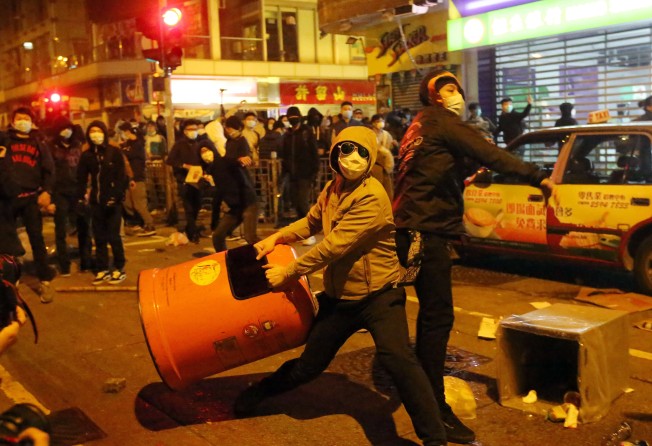Trio to appeal three-year jail sentences for role in Mong Kok riot
They were first protesters to be convicted of rioting charge after Lunar New Year clash

Three young protesters were on Friday jailed for three years each for their roles in last year’s clashes in Mong Kok, becoming the first to be punished on a riot charge over Hong Kong’s most violent public disturbance in decades.
Students Hui Ka-ki, 23, and Mak Tsz-hei, 20, and cook Sit Tat-wing, 33, were convicted of the contentious charge after the District Court characterised the street violence on Lunar New Year’s Day – which started off with a hawker control operation gone wrong – as a riot. All three plan to appeal the convictions and sentences.
The case centred specifically on clashes on the northbound lane of Nathan Road, near Soy Street, in the small hours of February 9, 2016 when the trio joined 20 others in hurling glass bottles and a bamboo pole at police officers.
Judge Sham Siu-man said a deterrent sentence was needed to send a message to the public that anyone who participated in the disturbance would have to pay a price, which could sometimes be very great.“The court cannot condone such violent behaviour,” he told a full house in court.
In the public gallery was Ray Wong Toi-yeung, convenor of the radical Hong Kong Indigenous group, who faces a High Court jury trial next January over rioting and incitement charges.
The rioting charge is punishable by 10 years’ imprisonment.
The judge said past cases showed that courts had to consider in sentencing the level of violence used, the scale of rioting, the number of people involved and whether there was any premeditation.
He said that an individual throwing a glass bottle might not merit a lengthy jail term, but the same could not be said of 20 to 30 people doing the same in a chaotic situation, as the scene could spiral out of control at any time.
“[The police officers’] lives were certainly under severe threat. It was their pure luck that no officer was injured,” he said.
However, the judge accepted that there was no direct evidence that participants had organised the riot, which he said was a key difference from the case of Vietnamese boatpeople rioting at Whitehead Detention Centre in 1989. All three defendants had no prior criminal record.
The University of Hong Kong said it was ready to assist its student, Hui, who was an undergraduate arts and education student before she deferred her studies due to the case. Mak was also said to have suspended schooling.
The court heard that Sit, a divorced father of a four-year-old, was a hard-working breadwinner supporting his ex-wife and his ailing mother and brother.
Speaking on behalf of the police force, Chief Inspector Baron Chan Shun-ching welcomed the ruling, saying it sufficiently reflected the severity of the offence.
Former prosecution chief Grenville Cross said the courts traditionally came down very hard on cases of public disorder, as it was only through such sentences that judges could send out the message that certain types of conduct would not be tolerated.
“On the face of it, a sentence of three years’ imprisonment, after trial, for a riot of the type we witnessed in Mong Kok last year, would appear to be within the appropriate range,” he said. “If anything, it might even be somewhat on the lenient side.”
Democratic Party legislator James To Kun-sun said he found the sentence to be an appropriate deterrent, while barrister Ronny Tong Ka-wah called it a “landmark decision” despite finding it a bit heavier than he had expected.
“Hong Kong was described as ‘a city of protests’ and has been lenient on protesters, but it does not mean that people can resort to violence,” Tong said.
Additional reporting by Tony Cheung